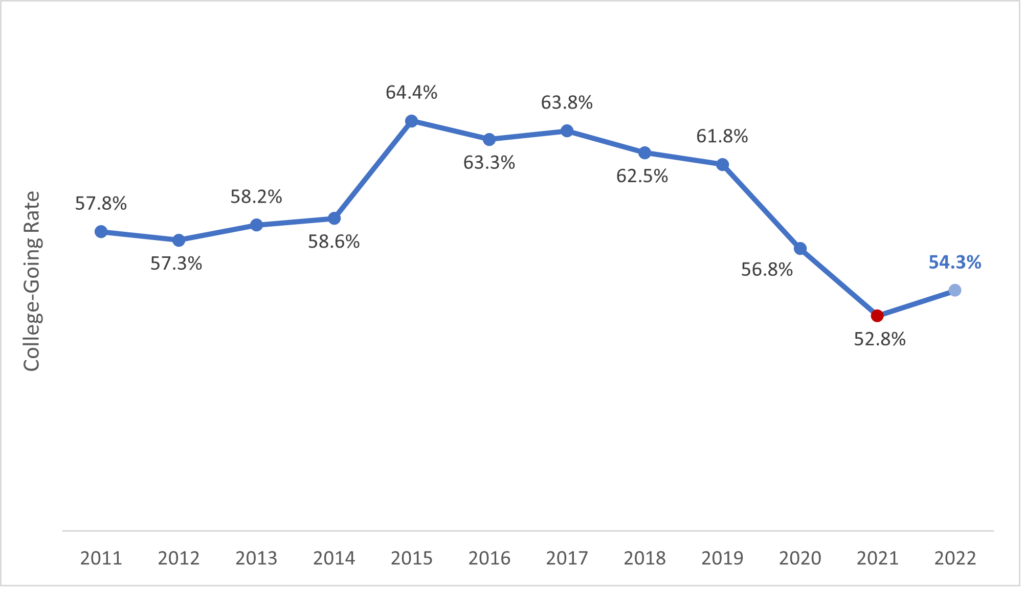
Education beyond high school plays a pivotal role in shaping our state’s economic future, fostering knowledge and skills for students, and opening doors to rewarding careers that lead to economic independence. Education is crucial to maintaining the positive trajectory that will help meet labor market needs as most jobs in Tennessee continue to require some type of postsecondary certificate and degree.
Today’s release of college-going data for Tennessee’s Class of 2022 reveals a 1.5 percentage point increase in the number of students who entered college directly after high school.
While this rise is important, as it marks the largest single-year growth since the Tennessee Promise Scholarship implementation in 2015, it still remains lower than our college-going rate high just a few years ago. It’s now time to lean into research-backed strategies that increase college going across our state and support student success.
A modest 1.5 percentage point increase reflects the continued massive disruption to our high school-to-college pathway as a result of the COVID-19 pandemic, the nation’s changing economy, and a declining perception of the value of a college credential among some Tennesseans. However, a deeper look into this increase reveals some promising trends for Tennessee students, especially those from historically underserved backgrounds.
Promising Highlights
- Black students overall, Hispanic females, and White males saw growth in college-going rates above the statewide growth of 1.5 percentage points. Hispanic female students led the way in improvement, with the largest growth rate across any race/gender subgroup (3.6 percentage point increase).
- We see significant growth for other traditionally underrepresented student groups which shows great promise toward closing college-going opportunity gaps in Tennessee. In particular, the difference in the college-going rate between White and Black students has narrowed for the first time since the start of the pandemic (13.6 points in 2021 versus 11.9 points in 2022).
- Students who participate in Dual Enrollment during their high school career are one and a half times more likely to enroll in college (78.4 percent versus 54.3 percent), signaling the importance of access to these early postsecondary opportunities for students while in high school.
- Enrollment at Tennessee Colleges of Applied Technology (TCATs) is also at a historic high as a greater number of high school graduates are enrolling in TCAT programs compared to prior years (8.2 percent of the college-going population).
Even with these promising highlights, other data point to an urgent need for continued efforts to reinvent high school-to-work pathways and strengthen postsecondary transitions.
Persisting Barriers
- The overall increase in college going for the class of 2022 from 52.8 percent to 54.3 percent is still significantly below the prepandemic rate of 61.7 percent for the class of 2019.
- Hispanic students continue to have the lowest rate across all race/ethnicity groups at a rate below 40 percent (37.3 percent).
- The portion of high school students attending Tennessee community colleges has continued to shrink over the last several years to 40.4 percent of the college-going population.
In 2022, the Tennessee Higher Education Commission announced the Tennessee Momentum Year to renew and articulate the value of higher education in Tennessee and to increase enrollment in education and training beyond high school. SCORE has been pleased to actively support this initiative, which aims to boost postsecondary access by achieving a college-going rate of 60 percent for the class of 2023, expanding adult enrollment through Tennessee Reconnect, and increasing coordination between education and workforce training to provide students with flexible options for economic advancement.
To increase the college-going rate to 60 percent over the next few years, we have to think and act differently as a state, and we need a bold visionary plan to increase the number of Tennessee high school graduates enrolling in and graduating from programs with a high-quality credential to meet the state’s workforce needs.
To accomplish this goal, we are highlighting a few innovative, research-backed strategies to increase college going for Tennessee students:
- Expand high-quality advising for students in both high school and postsecondary so that students are aware of the financial aid, postsecondary programs of study, and other opportunities available to them as they graduate high school and enter the workforce.
- Increase access to early postsecondary opportunities (EPSOs), like Dual Enrollment, in high school to build momentum toward college going and expose students to college opportunities while still in high school.
- Strengthen the state’s Ready Graduate measure to hold high schools accountable for increasing the college-going rate and for students earning credentials in high school aligned to workforce needs.
- Strengthen postsecondary finance in Tennessee, including improving financial aid opportunities to support students to attend college and examining the state’s outcomes-based funding formula to reward workforce readiness for students.
- Reimagine the state’s community college programming to include an increased focus statewide on workforce-informed programs.
- Use the state’s longitudinal data system to increasingly evaluate and inform state leaders on how to strengthen the connections between K-12, postsecondary, and work.
It’s clear that Tennessee is beginning to recover from the impacts of the pandemic on college going, but we can and must do more to ensure every Tennessee student reaps the economic benefits that a postsecondary credential offers. Years of college-going declines followed by a modest increase solidifies the need for immediate, bold, and sustained action.
We can achieve greater results, and SCORE stands ready to advance this work with state leaders, postsecondary leaders, partner organizations, and students.
David Mansouri is president and CEO of SCORE.
